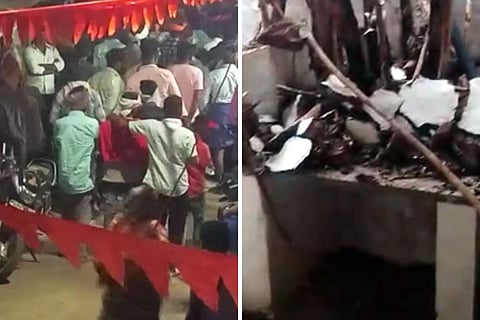

On March 3, Ramesh Malladad and his mother Hemavva tried to enter the Basaveshwara temple in Nandihalli village of Karnataka’s Haveri district. Thirty-one-year-old Ramesh, a member of the Madiga community (a term used for more than 50 Dalit sub-castes in Karnataka), regularly uploads YouTube videos on subjects like social justice. His defiant act of trying to enter the temple prompted a violent attack by the Panchamasali Lingayats (Other Backward Class, OBC) in the village who allegedly retaliated by damaging houses, pelting stones, molesting Madiga women and setting fire to at least two houses in the village’s Dalit colony.
Ramesh has long known the realities of caste discrimination in his village. Speaking to TNM, he said he tried to enter the Basaveshwara temple in the village in a bid to end the entrenched discrimination. "I was tired of being treated like an animal. All I wanted was to enter the temple. Is that a criminal offence? They didn't just target me, they attacked the entire Madiga community in the village," he said, adding, "They threw stones at our homes, destroyed our bikes, and molested our women. All because we want to be treated equally. We're not going to back down. We have nothing left to lose.” Despite facing resistance from the Panchamasalis, a group of Madiga Dalits stood their ground and forced the police to register an FIR, 12 hours after the incident occurred, on the afternoon of March 4.
The Madigas, a community that has been discriminated against as untouchables for centuries, alleged that several such incidents in Ranebennur taluk have gone unreported due to the fear of reprisals from the dominant communities. The oppressed are often offered a ‘compromise,’ either by the oppressors themselves or through police involvement. Describing the discrimination that Dalits face even today, Maridevappa, a Madiga and a member of Swabhimani Dalit Shakti, said, “Sadly, asking for equality is considered a crime in this region. The members of the dominant caste are willing to pay money to get away with their atrocities, but they refuse to give Madigas the equality they deserve.”
The March 3 incident has brought to focus the caste-based discrimination in Haveri's Ranebennur taluk, where a 2019 report documenting the lives of the Madiga families had found that they were not allowed to enter the village temples in 72 of the 87 villages. The study, conducted by Swabhimani Dalit Shakti (Self Respect Dalit Movement), included interviews of 4,076 Madiga families in Ranebennur. It revealed that untouchability is widespread in all the villages in the taluk. In addition to being denied temple entry, the Dalit community is not allowed to draw water from the wells or get haircuts in some of the villages.
Maridevappa added that Madiga Dalits in Ranebennur are also fighting for space to bury the dead from the community. “The Madigas in Nandihalli travel to neighbouring villages to bury their dead as the Panchamasalis don't allow us to use the common burial ground. We are not allowed to breathe freely nor are we at peace in death,” he said.
The Panchamasalis constitute the most extensive sub-sect of the Lingayat community, and they claim to constitute around 70% of the Lingayat population in Karnataka. They wield significant political influence in the state. Their persistent demand for reservation under the 2A category (most backward category of OBC), has put Chief Minister Basavaraj Bommai, who represents Shiggaon constituency of Haveri district, under pressure. Panchamasali agitations even led to cabinet approval for the creation of a new OBC category in December 2022 in order to accommodate their demands.
Despite the fact that untouchability and casteist slurs are punishable offences, very few are charged with these crimes as they are often accepted as a way of life in rural Karnataka, according to Maridevappa. He said, "Many times, the Madigas do not even have the courage to file a complaint, and when they do, they are met with peace meetings instead of strict action."
Speaking to TNM, Haveri’s Superintendent of Police Shivakumar Gunare said that they have registered a case under the Scheduled Castes and the Scheduled Tribes (Prevention of Atrocities) Act and sections of the Indian Penal Code. “A peace meeting will be held on March 13 with the residents and Deputy Commissioner,” he said. “While there have been previous cases of caste atrocity in the district, this is the first instance where houses were set on fire. Two individuals have been arrested, and the investigation is ongoing,” he added.